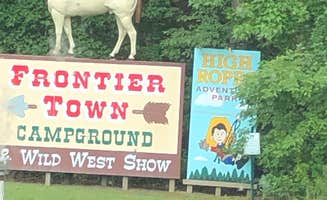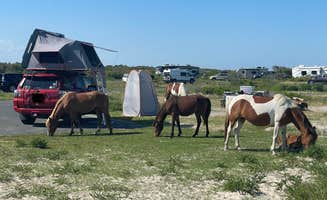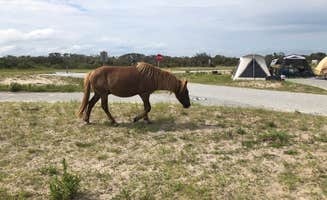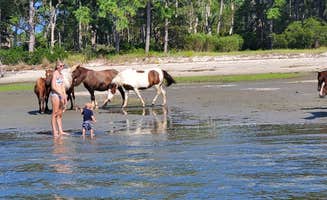Horse campgrounds near Millville, Delaware offer unique opportunities for equestrian enthusiasts within the Delmarva Peninsula's coastal environment. Located within driving distance of both the Atlantic Ocean and Chesapeake Bay, this region features a mix of salt marshes, maritime forests, and sandy terrain that creates diverse trail conditions. Winter temperatures typically range from 30-50°F, while summer temperatures regularly exceed 85°F with high humidity that affects both horses and riders.
What to Do
Trail riding on Assateague Island: Horse owners can access both bay and ocean riding directly from the specialized horse camping area. The EA Vaughn Wildlife Management Area provides an alternative with more seclusion but very primitive facilities.
Kayaking and canoeing: At Trap Pond State Park Campground, visitors can enjoy water activities amid cypress trees. "We wanted to kayak among the bald cypress trees (I highly recommend this)," reports Lee D., who appreciated the natural setting.
Fishing opportunities: Several campgrounds offer fishing access, particularly along inland waterways. "This is a great place to catch some good action fish. I've always had some success whenever I've been here," shares Sam D. about Martinak State Park Campground.
Beach exploration: The Chincoteague area provides both developed and remote beach options. "Assateague Island also has TWO bike/hike access beaches, and those are our favorite. You can drive to Assateague from Chincoteague with your bikes, and then park," explains Rita M., highlighting less crowded alternatives.
What Campers Like
Wildlife viewing: The wild horses remain the main attraction for many equestrian campers. "We camped in the Oceanside loop B. Right on the beach, but big dunes between sites and the ocean. Wild horses meandering through daily," reports Danielle at Assateague Island National Seashore Oceanside Campground.
Water proximity: Many appreciate the direct beach access from horse camping sites. "Loved the hiking trail (Bob Trail). It can also be used for biking. Our dogs loved the hike. Since it's just about all in the shade it wasn't bad for them. We also rented a kayak; awesome activity to do around the lake," shares James P. about Trap Pond State Park.
Seasonal variations: Off-season visits help avoid insects and crowds. "We have been going there as a very young child to now as a grandmother. When we think of Delaware we think of this park. The bath houses are clean and we can walk to the beach," notes Dawn T. about Delaware Seashore State Park Campground.
Private beach access: Alternative camping locations provide options beyond Assateague. "If you have canoe/kayak/SUPB it is a great point to launch off to explore the nature reserve next to camp Cove. Lots of wild horses to see," shares Tom C. about Tom's Cove Park.
What You Should Know
Bug preparation: Insect conditions can be extreme, particularly during summer months. "Love this place but be prepared for the bugs. Even enjoyed this in the winter," warns Michael W. about Bayside Assateague Campground.
Wind exposure: The coastal environment means constant wind that affects camping comfort. "We got a site to stay on our way through to OBX. We booked and arrived after hours, which wasn't an issue as they were like 3% occupied. The winds were nuts and over 50mph. We switched sites to spare our slide side," notes Joe R.
Limited facilities: Most horse camping areas have minimal amenities compared to standard campgrounds. Vault toilets are typically the only bathroom option, with no showers available directly at the horse camping areas.
Horse security requirements: All horses must remain secured at designated sites, with specific regulations preventing interaction with wild horses. Portable corrals must be brought by campers as the sites don't provide permanent containment.
Tips for Camping with Families
Off-season advantages: Many experienced campers recommend avoiding summer crowds and insects. "We were there on a Monday the week after Memorial Day and while the sites with the hookups were completely full, there were plenty of empty non-hookup sites," notes Lee D.
Activity options: Various campgrounds provide family-friendly programming. "This campground is very family friendly. There is so much to do. If you do go make sure you go for a week so you can try to do it all," advises Wilson G. about Sun Outdoors Frontier Town.
Site selection: More protected sites offer advantages for families with horses. "Sites were level and sand/grass. There are many trees and reasonable separation between sites (although you can easily see your neighbors)," shares Lee D. about Trap Pond State Park.
Equipment considerations: The coastal environment requires specific gear. "They also have a bike shed where you can sign out bikes for free for the day which was super neat. They also have wheelbarrows to borrow so if you have a drive up site you can use them," explains Lucia B.
Tips from RVers
Site conditions: RV campers note challenging terrain at horse camping areas. "All of the non-hookup sites are sand/grass/gravel and completely level; the hookup sites have paved camper pads (and are also level)," reports Lee D. about Delaware Seashore.
Wind protection: Strategic site selection helps with weather challenges. "Sites were level, in a loop around the bath house. There are also a few cabins available to rent," explains Jean C. about Martinak State Park.
Storage concerns: Limited storage options mean bringing essential supplies. "Trailer parking accommodates both smaller and larger horse trailers on the packed sand," observes one visitor regarding horse camping facilities.
Seasonal planning: Timing affects RV site availability significantly. "We stayed for 5 nights and every night was quiet except Friday- that's when our neighbors decided to get drunk and sing karaoke until 2am," shares Gayle B.





